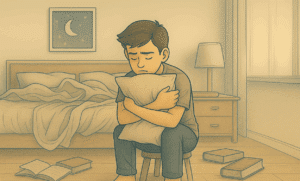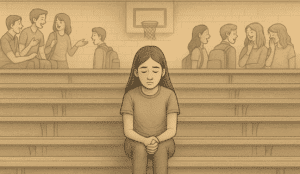Let’s face it—social media is everywhere, and for teens, it’s practically a second home. Between TikTok, Instagram, Snapchat, and all the other platforms, they’re constantly connected, scrolling through an endless stream of content.
As parents, you’ve probably wondered how all that screen time is affecting your teen’s mental health. At Mission Prep Healthcare, we understand how important it is to address the effects of social media on teenagers, not just for them, but for the entire family.
Let’s dive into how social media is shaping the mental well-being of teens today, and what you can do as a family to support a healthier relationship with it.
Social Media and Teen Mental Health: An Overview
To give you some perspective, over 90% of teens use social media regularly. That’s a huge number, and it shows just how much these platforms are embedded in their daily lives.
Now, social media isn’t all bad. In fact, it can have some pretty positive effects. Teens can stay connected with their friends, find peer support, and even use it to support causes they care about. For some, it’s a creative outlet or a way to learn about the world.
But here’s the thing—while social media can be a way to build community and connection, it can also take a toll on mental health. Just like anything else, too much or unmonitored use can lead to problems.
At Mission Prep, we’ve seen firsthand how the effects of social media on teenagers can contribute to anxiety, depression, and other mental health challenges.
Negative Effects of Social Media on Teenagers
- Comparison and a Damaged Self Esteem: One of the most damaging aspects of social media is the constant comparison it creates. Teens are bombarded with images of “perfect” lives—flawless skin, fun vacations, and endless selfies with friends. It’s easy for them to feel like they’re not measuring up, even though they’re only seeing a curated highlight reel. This comparison can chip away at their self-esteem, leaving them feeling inadequate or unworthy.
- Cyberbullying: Then, there’s cyberbullying. Unlike traditional bullying that happens face-to-face, cyberbullying follows teens wherever they go, even after they leave school. Social media can be a breeding ground for harassment, and it’s not always easy to detect. This constant exposure to negative comments or hurtful messages can have serious effects on a teen’s mental health. Depression, anxiety, and even suicidal thoughts are common consequences of online bullying.
- Dependence on Technology: Let’s also talk about the addictive nature of social media. It’s designed to keep us hooked. For teens, this can mean hours spent scrolling through posts, videos, and comments, often to the point where it disrupts their sleep, schoolwork, and even social interactions. They can become so wrapped up in their online world that they lose touch with the real world around them. This overuse of social media can increase feelings of isolation and loneliness, making it harder for them to connect with others face-to-face.
Social Media’s Role in Anxiety, Depression, and Loneliness
Social media plays a significant part in how teens experience anxiety, depression, and loneliness. Let’s break down each of these impacts:
- Increased Anxiety: With social media, teens feel the need to always be “on.” Whether it’s responding to messages, keeping up with trends, or worrying about missing out on something (FOMO), this constant connectivity can lead to heightened anxiety. The pressure to always stay engaged or relevant can make teens feel stressed and overwhelmed, causing them to experience a sense of unease in their daily lives.
- Depression Linked to High Social Media Use: Research has shown a strong link between high social media use and increased rates of depression in teenagers. The constant comparison to others, exposure to cyberbullying, and pressure to present a “perfect” image online can contribute to feelings of sadness and hopelessness. Teens may find themselves feeling more isolated and unworthy, even though they appear to be connected to hundreds of people.
- Feelings of Loneliness Despite Being “Connected”: You might think that being surrounded by hundreds of online “friends” would make teens feel more socially supported. However, many teens report feeling lonelier despite these virtual connections. Social media can create a false sense of intimacy, where they have many superficial relationships but few deep, meaningful connections in real life. This disconnect can lead to a strong sense of loneliness, as online interactions rarely provide the emotional support needed to combat those feelings.
How Families Can Support Social Media Use
So, what can you do as a parent to help your teen navigate the tricky waters of social media?
- Open the conversation: Ask your teen about their social media experience.
- How do they feel about it?
- Do they feel pressure to keep up?
- Are they experiencing negative interactions online?
- Set boundaries and encourage balance:
- Create healthy limits for social media use.
- Designate specific times for social media.
- Promote screen-free activities, like sports or family outings.
- Monitor use while allowing autonomy:
- Stay informed about their online activities without hovering.
- Give them space to learn and manage their online presence responsibly.
- Encourage offline activities:
- Suggest joining clubs or playing sports.
- Promote spending time with friends in person.
- Help them develop interests outside of social media for a healthy balance.
How Can I Tell If My Teen’s Mental Health Is Being Affected By Social Media?
As a parent, it’s totally normal to worry about how your teen is using social media and wonder if you’re overreacting. But the truth is, many teens deal with real challenges when it comes to social media and their mental health.
It’s super important to recognize the signs of potential mental health issues so you can be there for them.
Here are some key indicators to watch for:
- Mood Changes: Look for shifts in your teen’s mood, such as increased withdrawal, anxiety, or frustration. A once-happy teen may seem more easily upset or less engaged in activities they used to enjoy.
- Excessive Screen Time: Notice if they are spending an excessive amount of time on their devices, especially if it comes at the expense of sleep or face-to-face interactions with friends and family.
- Feelings of Inadequacy: Pay attention if they frequently express feelings of inadequacy or jealousy after browsing social media posts from friends or influencers.
- Changes in Social Interactions: Observe any decrease in real-life social interactions. If they seem to prefer online communication over hanging out with friends in person, it could be a sign.
How Mission Prep Healthcare Can Help
At Mission Prep, we believe in empowering our clients to truly grasp the pros and cons of their tech use. We help them strike a healthy balance between those high-energy dopamine hits and more calming experiences, so they can navigate their digital lives with ease.
In a safe and supportive environment, our clients get to practice building healthy habits and essential skills. During our intake process, we dive deep into how technology dependency impacts teens, recognizing its big role in their everyday lives.
We’ll talk about how our tech habits influence who we are, our relationships, and our overall well-being. We focus on helping teens understand how technology affects their brain, sleep, and mood through psychoeducation. By sharing this information, we hope to encourage healthier tech habits and inspire positive changes in their mental health. If you’re a parent worried that your teen is struggling with mental health because of social media, don’t hesitate to reach out—we’re here to help!


















